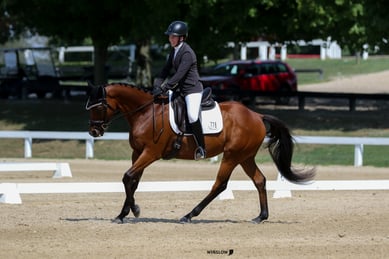 Hocking College's Equine Program Manager, Bethany Siehr, recently competed and placed in the third annual Thoroughbred Incentive Program National Championship.
Hocking College's Equine Program Manager, Bethany Siehr, recently competed and placed in the third annual Thoroughbred Incentive Program National Championship.
Overall, some 500 thoroughbreds competed in a total of 26 divisions comprising English Pleasure, Western Pleasure, Dressage, Western Dressage, Hunters, and Jumpers.
Siehr won the dressage division earning the title, First Level National Champion. She had the distinction of winning this same honor at a Training Level the year before. This event is highly competitive. Siehr shared that the top three horses were separated by 0.2%.
Siehr’s noted that this show was only open to Off the Track Thoroughbreds (OTTBs). These are Jockey Club-registered Thoroughbred horses that were previously racing or in training to race. These horses were either retired due to injury, lack of talent, or old age.
Siehr’s reflected that her involvement in events such as this help her to “stay current” on changes in the equine industry.
“I continue to compete, learn, and improve because it's my passion," said Siehr, "But also because ultimately it helps my students.”
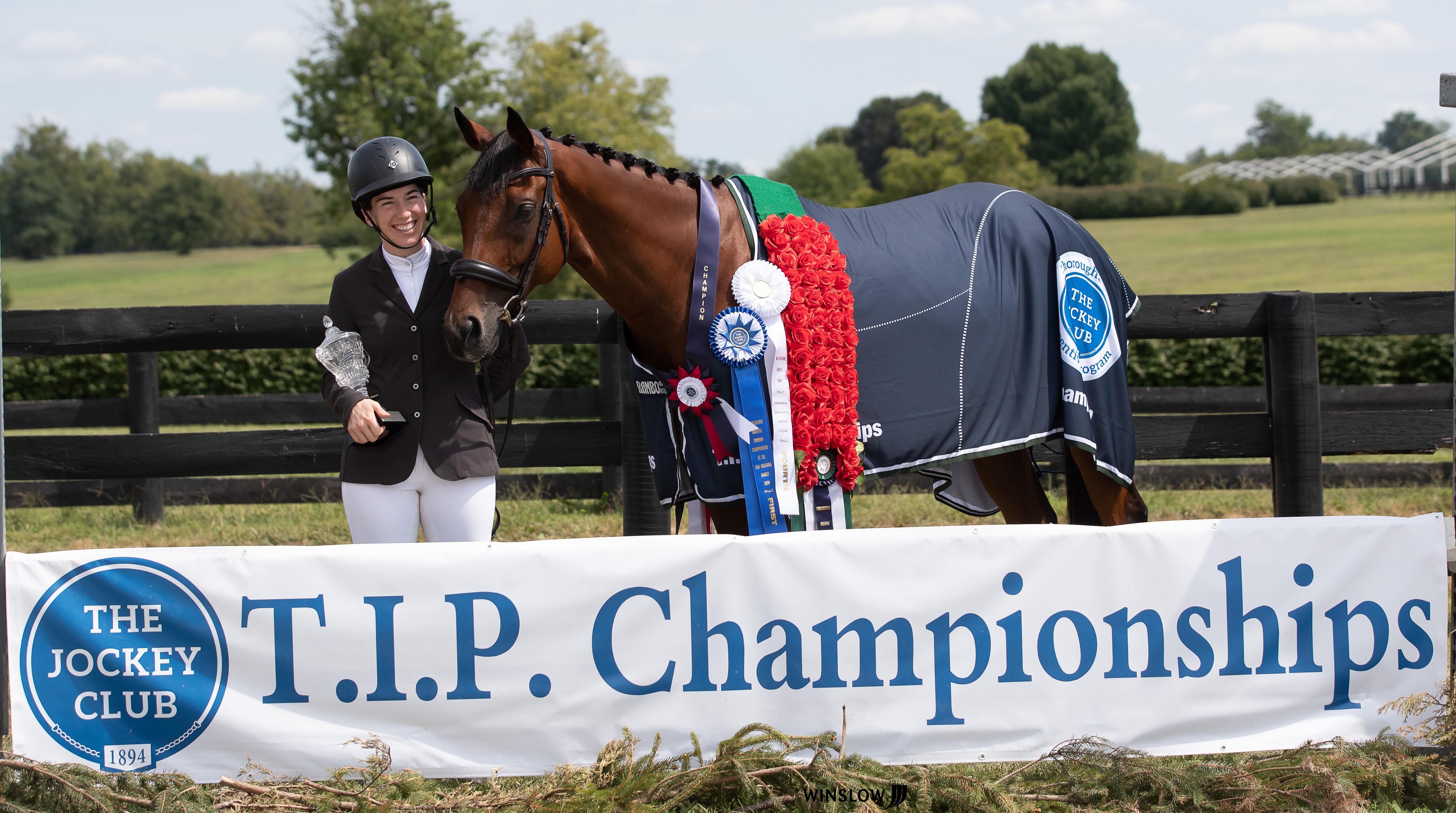
About the Equine Studies Program
Hocking College in Nelsonville, Ohio offers degrees in Wilderness Horsemanship, Equine Health & Complementary Therapies, and Farrier Science.
Hocking College is a two-year college that focuses on interactive, hands-on learning to promote success. We are committed to providing learning experiences that enable our students to acquire the skills and knowledge essential to their future success.
Hocking College is located in Nelsonville, Ohio with more than 50 associate degree and certificate programs to choose from and we currently offer four Equine Associates degrees.
Wilderness Horsemanship
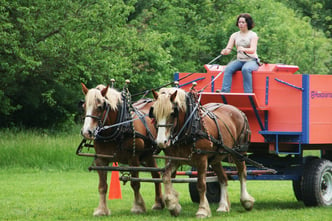 The Wilderness Horsemanship degree program was originally developed to teach students the skills needed for being a backcountry park ranger or wilderness guide. Since its inception, this program has expended to developing more self-sufficient horsemen by having students with horses, mules, and people in wilderness settings. In addition, students learn how to drive wagons through various terrain, pack horses into the backcountry, teach basic riding skills, and properly use and repair riding equipment.
The Wilderness Horsemanship degree program was originally developed to teach students the skills needed for being a backcountry park ranger or wilderness guide. Since its inception, this program has expended to developing more self-sufficient horsemen by having students with horses, mules, and people in wilderness settings. In addition, students learn how to drive wagons through various terrain, pack horses into the backcountry, teach basic riding skills, and properly use and repair riding equipment.
Farrier Science and Business
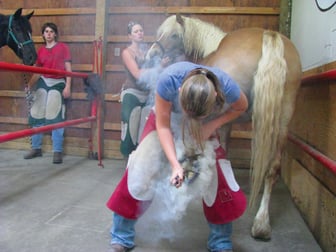 Hocking College offers one of only a few farrier science associate degree programs in the United States. The Farrier Science and Business program offers a unique combination of farrier skills and business management. Students learn the newest and safest techniques and develop skills on gas forges while developing skill in shoeing performance horses and corrective shoeing.
Hocking College offers one of only a few farrier science associate degree programs in the United States. The Farrier Science and Business program offers a unique combination of farrier skills and business management. Students learn the newest and safest techniques and develop skills on gas forges while developing skill in shoeing performance horses and corrective shoeing.
Farriers are largely self-employed; therefore, the business portion of this program provides students with basic business skills such as management and accounting and more advanced skills needed by an entrepreneur in the equine industry.
Equine Health and Complementary Therapies
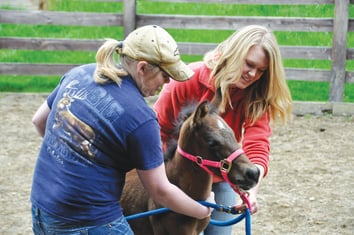 The Equine Health and Complementary Therapies program focuses on the health care component of the horse industry. The program was developed to meet the industry demand for qualified horse care technicians. Students will develop skills in traditional health care such as nutrition, anatomy and physiology, broodmare and foal care and non-traditional complementary therapies. Students in this program will gain valuable hands-on experience their first semester by acting as a vet assistant or by spending the night doing foal watch. Coupled with classes in equine business management, marketing, and accounting graduates of this program will have gained the skills necessary to start their own business.
The Equine Health and Complementary Therapies program focuses on the health care component of the horse industry. The program was developed to meet the industry demand for qualified horse care technicians. Students will develop skills in traditional health care such as nutrition, anatomy and physiology, broodmare and foal care and non-traditional complementary therapies. Students in this program will gain valuable hands-on experience their first semester by acting as a vet assistant or by spending the night doing foal watch. Coupled with classes in equine business management, marketing, and accounting graduates of this program will have gained the skills necessary to start their own business.
In addition to traditional health care, Hocking’s program includes students hands-on experience in the newer disciplines of equine acupressure and massage. This unique component teaches students proper massage techniques to increase performance and wellbeing. Students will have the ability to hone their skills on the 50+ horses housed on campus.
Animal Assisted Therapy: Equine Track
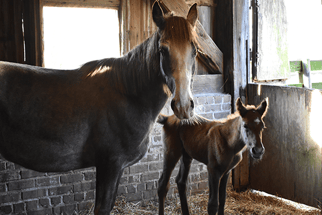 Hocking College's Animal Assisted Therapy (Equine Track) Program is a two-year program focuses on aspects of humans using horses as a tool for therapy purposes. It utilizes a combination of knowledge and skills such as horse care, riding instruction, and aspects of specific therapies. There are actually four branches of equine assisted therapy, which are Equine Assisted Psychotherapy Equine Facilitated Learning, Hippotherapy and Therapeutic Riding.
Hocking College's Animal Assisted Therapy (Equine Track) Program is a two-year program focuses on aspects of humans using horses as a tool for therapy purposes. It utilizes a combination of knowledge and skills such as horse care, riding instruction, and aspects of specific therapies. There are actually four branches of equine assisted therapy, which are Equine Assisted Psychotherapy Equine Facilitated Learning, Hippotherapy and Therapeutic Riding.
For more information on Hocking College’s Equine Program Manager Bethany Siehr by email at siehrb@hocking.edu or by phone at (740) 753-6282.



